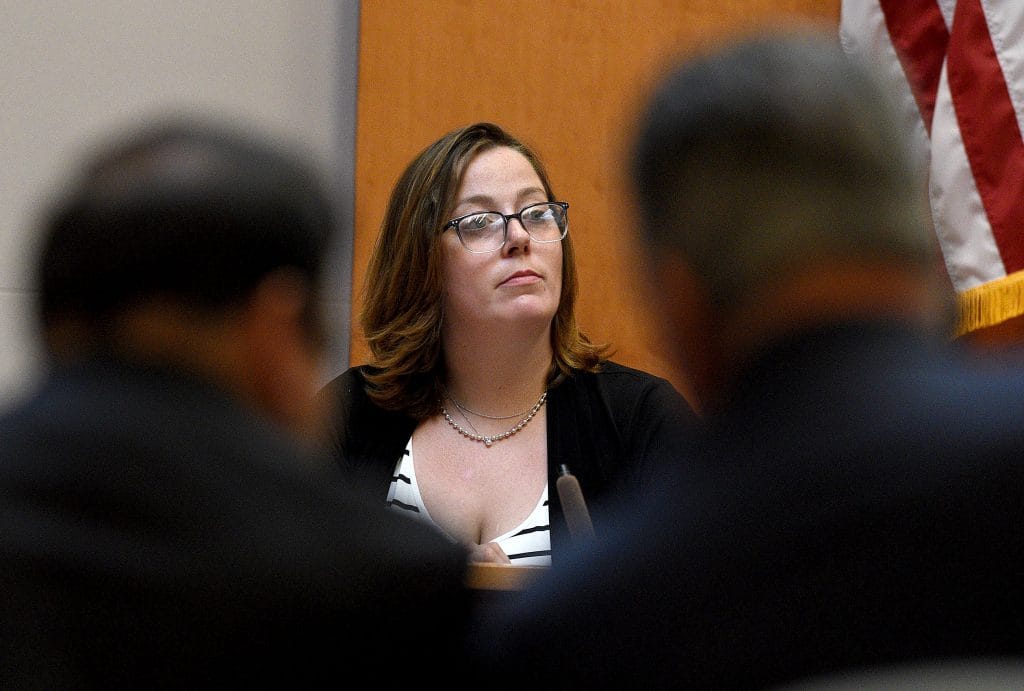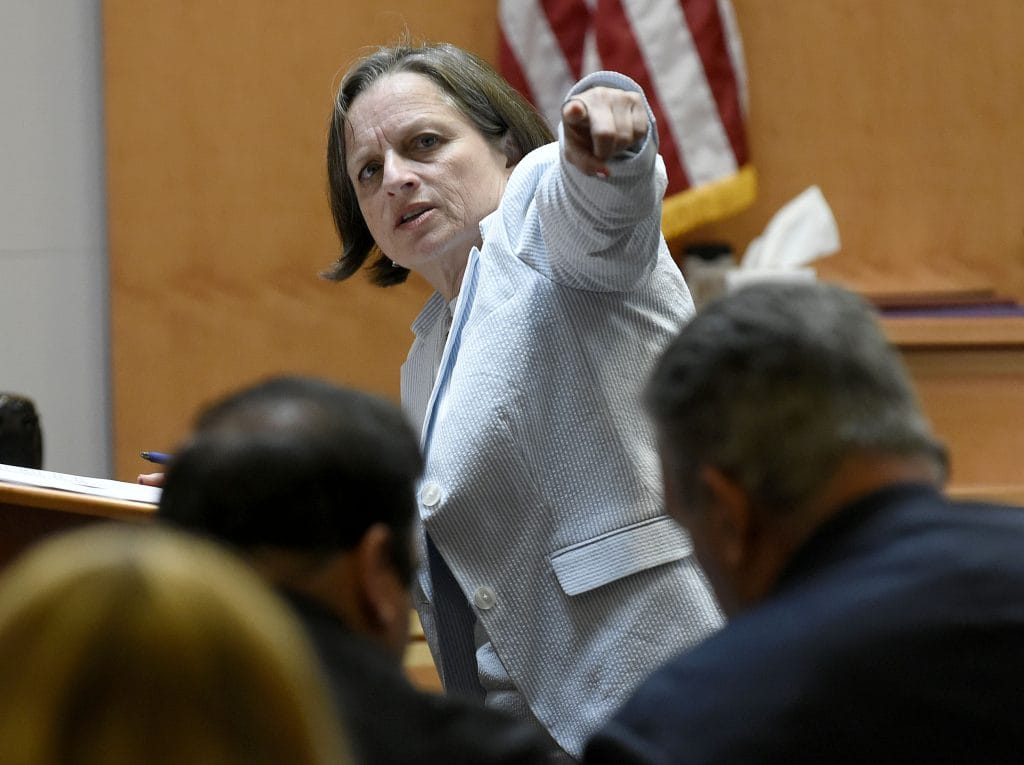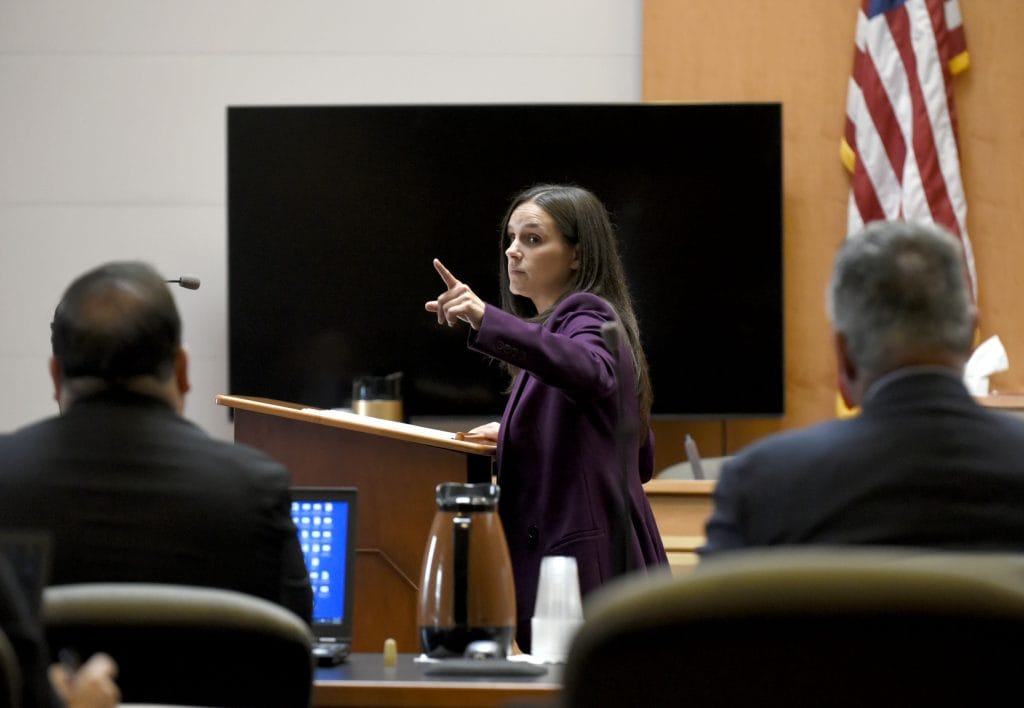Eckersley’s attorneys say evidence doesn’t support guilty verdicts, want judge to overturn convictions
Defense attorneys for Alexandra Eckersley, found guilty of three charges related to the abandonment of her newborn infant in freezing temperatures in 2022, is asking a judge to set aside the verdict and, if not, to order a new trial.


MANCHESTER, NH – Defense attorneys for Alexandra Eckersley, found guilty of three charges related to the abandonment of her newborn infant in freezing temperatures in 2022, is asking a judge to set aside the verdict and, if not, to order a new trial.
Eckersley, 27, was found guilty of falsifying physical evidence, reckless conduct and endangering the welfare of a child but acquitted of two charges of second-degree assault. Those felony charges allege she caused the infant to suffer hypothermia and respiratory distress by abandoning him in a tent in 15-degree weather.
The jury of six men and six women deliberated 11 ½ hours over three days after listening to testimony over four days before delivering the split verdict.
The falsifying physical evidence charge is a class B felony carrying a sentence of 3 ½ to 7 years in prison. The other charges, reckless conduct and endangering the welfare of a child, are both enhanced misdemeanors carrying a sentence of 2 to 5 years in prison.
Eckersley was accused of abandoning her premature newborn son in a makeshift tent in freezing conditions on Dec. 26, 2022, and directing emergency workers a half-mile in the opposite direction from where he could be found.
Eckersley, who had a lengthy and complicated mental health history, testified she did not know she was pregnant and that she didn’t bring the infant with her when she went to the West Side Ice Area to get a signal on her cell phone to call 911 because “I thought he was dead.”
Her boyfriend, George Theberge, told her the infant did not have a pulse, she testified. Theberge, who was wanted on various charges, fled the area as the ambulance arrived on scene.

Defense attorneys Kimbery A. Kossick and Jordan Strand, in their motion filed Aug. 12, 2024 in Hillsborough County Superior Court North, say that viewing the evidence in the light most favorable to the state, no rational jury could have returned a guilty verdict on any of the three charges the jury convicted Eckersley of doing.
On the falsifying physical evidence charge, the defense argues the state’s own evidence was that multiple people told Eckersley she was not in trouble and they just were looking for the baby. Eckersley, according to the state, was worried about getting in trouble with George Theberge, her boyfriend who fled the scene, not the police.
Testimony, the defense attorneys say, was that Eckersley was emotional and “hysterical” and actively experiencing postpartum. Based on that, the defense said no jury could find beyond a reasonable doubt that Eckersly believed there was an official investigation taking place or that she acted purposely.
On the reckless conduct charge, they say the evidence was that Eckersley thought the baby was dead. Eckersley, who took the stand in her own defense, testified that Theberge told her the baby had no pulse and she believed it was dead.
“Therefore, she could not have consciously disregarded a risk that he could suffered a protracted injury,” they say in the motion.
On the charge of endangering the welfare of a child, the attorneys again said Eckersley thought the baby was dead.
“Therefore, no rational jury could find that Allie acted purposely to violate a duty of care. Therefore, the guilty verdict on the endangering the welfare misdemeanor must be vacated and that complaint must be dismissed,” the attorneys say in their motion.
In New Hampshire, it is rare for a judge to overturn a jury verdict. Should Judge Amy Messer refuse to overturn the jury’s verdicts, the defense argues that a new trial is warranted.
They contend the only evidence of Eckersley’s knowledge that the baby was alive is her own testimony that she heard the baby cry briefly and then Theberge told her the baby was dead.
“The testimony was that the heat was on when she left the tent and the only person who returned there was George Theberge,” the attorneys’ wrote.
The baby’s skin temperature, when taken at Catholic Medical Center where the infant was brought for treatment, was 84 degrees Fahrenheit.
“Weighing the evidence, this Court should grant Alexandra Eckersley a new trial in fairness to her and in vindication of the principle that verdicts should be supported by the evidence,” according to the motion.
Eckersley testified she told the 911 operator that the baby could be found on the other side of a trestle bridge in Goffstown and that it had cried, an indicator he was alive. However, the 911 operator did not relay that information to first responders and instead told them the infant was not viable.
First Assistant Hillsborough County Attorney Shawn Sweeney, who prosecuted the case along with Assistant Hillsborough County Attorney Alex Gatzoulis, said in his closing that when the 911 call came in, it was a medical emergency for Eckersley who had just given birth. There was no need to alert police. However, once it was learned an infant was lost in the woods, it required police involvement and ultimately, Eckersley’s arrest for abandoning the baby.
The defense said Eckersley told both the 911 operator and a police officer where the baby could be found – on the Goffstown side of a trestle bridge off the West Side rail trail. And, according to Kossick, Eckersley told the EMT and police officer William Collins when he arrived on scene that she heard the baby crying when it was born, indicating it was alive.
However, the 911 operator, Kossick said, told firefighters the infant was not viable and never relayed the information to police that it had cried when born.
The defense said no one was listening to Eckersley.

Prosecutors maintained Eckersley never told them exactly where the baby was and that, at the scene, she directed them to the area of the ball fields about a half mile from the makeshift tent. Eckersley told emergency workers she was coming back from the store when she unexpectedly gave birth near the ballfields in the area of the West Side Ice Arena in Manchester not in the tent located in Goffstown.
Rescuers searched the area of the ballfields for about an hour before Eckersley led them to the tent and the infant.
Eckersley, while being treated for heavy bleeding for the second time in the ambulance, said something “clicked in her head” and she told them she would lead them to the tent.
Eckersley has a long, complicated history of mental illness, according to a forensic psychologist who testified at the trial. She had attended structured schools, where she never took a sex education class, and was treated in psychiatric hospitals on four occasions, the last time after giving birth.
At the age of 20, she was in residential placement that she left after meeting an older man online in NH. She came here to live with him and became homeless.
On Dec, 26, 2022, she had been without a home for five years.
Rescuers found the infant on the tent floor suffering from hypothermia and in respiratory distress. A video clip, from the body worn camera of Officer William Collins, was played for the jury. It recorded fellow Officer Joseph Vitale finding the baby.
“Oh, Jesus Christ. It’s here. Yeah, it’s still alive. It’s still moving,” Vitale is heard saying. EMTs began CPR on the child and while an ambulance was called to the scene, they opted to take the baby to the hospital via a fire truck that was already there. En route to Catholic Medical Center, the baby opened its eyes.
Hours later, after the infant was stabilized, he was transferred to Dartmouth-Hitchcock Medical Center in Lebanon for further treatment. The child, who Eckersley named Edward Ruth for her grandparents, recovered. Now 19 months old, he lives with Eckersley and her mother in Massachusetts.
Defense attorneys maintain Eckersley committed no crime. “Giving birth while homeless is not a crime,” Kossick told the jury in her closing argument.
If anyone should have been charged, she said, it was Theberge, Eckersley’s 45-year-old boyfriend who went back to the tent three times. He had the habit of turning off the heater because, Eckersley testified, he got too hot. She, on the other hand, was always cold and would turn it back on.
Eckersley is the adopted daughter of Hall of Fame Red Sox pitcher Dennis Eckersley.
Prosecutors have yet to file a response to the defense motion.
Eckersely is to be sentenced on Oct. 17, 2024.





